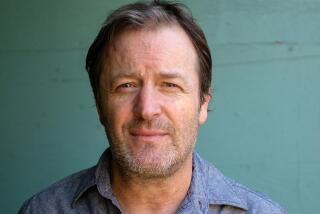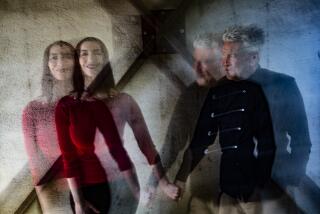Living for the Odd Moments Along Lynch’s ‘Highway’
No one has ever needed to tell David Lynch to stop making sense. From “Eraserhead” through “Twin Peaks: Fire Walk With Me,” his films have focused on the creepy illogic of nightmare, on mocking reason and celebrating the dream state. With this director, what you get is what you see.
“Lost Highway,” troublesome but also the director’s most accomplished work since “Blue Velvet” a decade ago, takes this tendency even further. Beautifully made but emotionally empty, it exists only for the sensation of its provocative moments. Garnished with sex and violence, it alternates scenes that exquisitely marry sound and image with moments that seem to come from a metaphysical stag film.
Working with co-screenwriter Barry Gifford (who wrote the novel Lynch’s “Wild at Heart” was based on), the director has taken traditional film noir elements--gangsters, youthful hunks, jazz musicians, unattainable women and implacable fate--and tossed them into a conceptual Mixmaster. The result is one weirded-out movie that plays as if it were coming and going at the same time.
Though “Lost Highway” presents enough traditional mysteries to mimic the shape of something that might make sense, it has no intention of offering anything like solutions. This film answers no questions, solves no riddles and treats questions of traditional logic as if they came from a different universe.
In fact, “Lost Highway” is set up around the theme of parallel worlds, around the notion of people switching places and shapes and doubling back on themselves through alternate universes in a way that can be neither argued with nor explained.
Introduced first are Hollywood Hills residents Fred Madison (Bill Pullman) and his wife, Renee (Patricia Arquette). He’s a tenor sax player who hangs at the Luna Lounge; she’s a dark-haired stunner who seems to have no occupation except to look sexually provocative.
*
The Madisons don’t seem to have the happiest of marriages, and they’re not made any cheerier by the arrival on their doorstep of a series of increasingly explicit videos of unknown origin that have been mysteriously taken inside their house. The police don’t know what it means, and neither will you.
Making things worse for Fred is a chance meeting at a party thrown by one of Renee’s kinky friends with someone known simply as Mystery Man. Disconcertingly played by Robert Blake as a living death’s head with a laugh like the Shadow, Mystery Man has no trouble living up to his name. Able to be in several places at the same time, he’s unnerving, intriguing and completely opaque.
If all this weren’t strange enough, midway through “Lost Highway” Fred gets these killer headaches and abruptly turns into another person. That would be Pete Dayton (Balthazar Getty), a handsome young garage mechanic from the Valley with Gary Busey for a father, Natasha Gregson Wagner for a girlfriend and Richard Pryor for a boss.
Pete’s best client is the wealthy Mr. Eddy (Robert Loggia), an aging gangster who, in the film’s wackiest scene, displays a startling passion for road courtesy when he acts on his credo that “tailgating is one thing I cannot tolerate.”
Mr. Eddy’s best girl is Alice Wakefield, who is not only as blond as Renee Madison was dark, she is also played by Arquette. When, in a sizzling melding of vocals and picture, Alice gives Pete the come-hitherest of looks as Lou Reed’s version of “This Magic Moment” hits the soundtrack, it’s clear that Pete will have the same kind of trouble with her that doppleganger Fred had with Renee.
More in its imagery than in its baroque plotting, “Lost Highway” is best at creating a sense of unease. Working with cinematographer Peter Deming and longtime composing collaborator Angelo Badalamenti, Lynch has put together some thoroughly spooky situations. In the hands of this crew, even something as straightforward as a ringing phone in an empty room can create the feeling that the most awful thing is about to happen.
Less successful, though sometimes effective, is the film’s stylized use of dialogue. Lynch favors a flat, uninflected acting style and likes having throwaway lines like “Who the hell owns that dog?” read as if they were pregnant with meaning. It takes a strong performer to make an impression under those conditions and, aside from Blake, only Arquette’s uncompromisingly sensual presence has the force to do so.
But though it can seem intriguing at any given moment, those moments have a tendency to get ultra-violent and sexually exploitative. Plus, it’s difficult to sustain Lynch’s kind of showy nihilism for 2 hours and 15 minutes, no matter how much skill is involved. “I like to remember things my own way, how I remember them, not how they actually happened,” says Fred Madison, speaking for a director not shy about amusing himself with on-screen games and not really worried if an audience wants to come along for the ride or not.
* MPAA rating: R, for bizarre violence and sexual content, and for strong language. Times guidelines: scenes of bloody violence and graphic sexual encounters.
(BEGIN TEXT OF INFOBOX / INFOGRAPHIC)
‘Lost Highway’
Bill Pullman: Fred Madison
Patricia Arquette: Renee Madison/Alice Wakefield
Balthazar Getty: Pete Dayton
Robert Blake: Mystery Man
Natasha Gregson Wagner Sheila
Robert Loggia: Mr. Eddy/Dick Laurent
Gary Busey: Bill Dayton
Richard Pryor: Arnie
Released by October Films. Director David Lynch. Producers Deepak Nayar, Tom Sternberg, Mary Sweeney. Screenplay David Lynch & Barry Gifford. Cinematographer Peter Deming. Editor Mary Sweeney. Costumes Patricia Norris. Music Angelo Badalamenti. Production design Patricia Norris. Set decorator Leslie Morales. Running time: 2 hours, 15 minutes.
* In limited release.
More to Read
Only good movies
Get the Indie Focus newsletter, Mark Olsen's weekly guide to the world of cinema.
You may occasionally receive promotional content from the Los Angeles Times.











